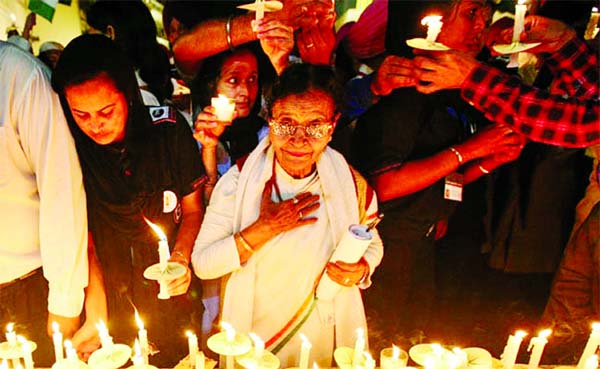
AFP :
Britain’s high commissioner to India laid a wreath on Saturday at commemorations for the 100th anniversary of the Amritsar massacre, one of the worst atrocities of colonial rule for which London is still to apologise.
The Jallianwala Bagh massacre, as it is known in India, saw British troops fire on thousands of unarmed men, women and children in the northern city of Amritsar on the afternoon of April 13, 1919.
The number of casualties from the event, which galvanised support for independence, is unclear. Colonial-era records put the death toll at 379, but Indian figures put the number closer to 1,000. Even 100 years on, Britain has still made no official apology and Dominic Asquith, high commissioner, on Saturday followed suit at the Jallianwala Bagh walled garden where bullet marks are still visible. “You might want to re-write history, as the Queen said, but you can’t,” Asquith said. “What you can do, as the Queen said, is to learn the lessons of history. I believe strongly we are. There is no question that we will always remember this. We will never forget what happened here.” In the memorial’s guest book Asquith, a descendant of Herbert Asquith, prime minister from 1908-16, called the events “shameful”. “We deeply regret what happened and the suffering caused,” he wrote, echoing comments by Prime Minister Theresa May
in parliament on Wednesday when she too stopped short of apologising. Prime Minister Narendra Modi in a tweet called the tragedy “horrific” and that the memory of those killed “inspires us to work even harder to build an India they would be proud of.”
Opposition leader Rahul Gandhi was present in Amritsar and on Twitter called the massacre “a day of infamy that stunned the entire world and changed the course of the Indian freedom struggle”.
In a visit in 2013 then British prime minister David Cameron described what happened as “deeply shameful” but stopped short of an apology. In 1997, Queen Elizabeth II laid a wreath at the site but her gaffe-prone husband Prince Philip stole the headlines by reportedly saying that Indian estimates for the death count were “vastly exaggerated”. On Wednesday, May told the House of Commons that the massacre was “a shameful scar on British Indian history”. “We deeply regret what happened and the suffering caused,” May said.
Amarinder Singh, chief minister of Punjab state, said May’s words were not enough. He said “an unequivocal official apology” is needed for the “monumental barbarity”.
Singh said thousands attended a candlelight march Friday in memory of the victims ahead of a commemoration ceremony later on Saturday that was attended by the Indian vice-president and hundreds of people.
Britain’s high commissioner to India laid a wreath on Saturday at commemorations for the 100th anniversary of the Amritsar massacre, one of the worst atrocities of colonial rule for which London is still to apologise.
The Jallianwala Bagh massacre, as it is known in India, saw British troops fire on thousands of unarmed men, women and children in the northern city of Amritsar on the afternoon of April 13, 1919.
The number of casualties from the event, which galvanised support for independence, is unclear. Colonial-era records put the death toll at 379, but Indian figures put the number closer to 1,000. Even 100 years on, Britain has still made no official apology and Dominic Asquith, high commissioner, on Saturday followed suit at the Jallianwala Bagh walled garden where bullet marks are still visible. “You might want to re-write history, as the Queen said, but you can’t,” Asquith said. “What you can do, as the Queen said, is to learn the lessons of history. I believe strongly we are. There is no question that we will always remember this. We will never forget what happened here.” In the memorial’s guest book Asquith, a descendant of Herbert Asquith, prime minister from 1908-16, called the events “shameful”. “We deeply regret what happened and the suffering caused,” he wrote, echoing comments by Prime Minister Theresa May
in parliament on Wednesday when she too stopped short of apologising. Prime Minister Narendra Modi in a tweet called the tragedy “horrific” and that the memory of those killed “inspires us to work even harder to build an India they would be proud of.”
Opposition leader Rahul Gandhi was present in Amritsar and on Twitter called the massacre “a day of infamy that stunned the entire world and changed the course of the Indian freedom struggle”.
In a visit in 2013 then British prime minister David Cameron described what happened as “deeply shameful” but stopped short of an apology. In 1997, Queen Elizabeth II laid a wreath at the site but her gaffe-prone husband Prince Philip stole the headlines by reportedly saying that Indian estimates for the death count were “vastly exaggerated”. On Wednesday, May told the House of Commons that the massacre was “a shameful scar on British Indian history”. “We deeply regret what happened and the suffering caused,” May said.
Amarinder Singh, chief minister of Punjab state, said May’s words were not enough. He said “an unequivocal official apology” is needed for the “monumental barbarity”.
Singh said thousands attended a candlelight march Friday in memory of the victims ahead of a commemoration ceremony later on Saturday that was attended by the Indian vice-president and hundreds of people.

